- Joined
- Oct 9, 2007
- Messages
- 47,886 (7.38/day)
- Location
- Dublin, Ireland
| System Name | RBMK-1000 |
|---|---|
| Processor | AMD Ryzen 7 5700G |
| Motherboard | Gigabyte B550 AORUS Elite V2 |
| Cooling | DeepCool Gammax L240 V2 |
| Memory | 2x 16GB DDR4-3200 |
| Video Card(s) | Galax RTX 4070 Ti EX |
| Storage | Samsung 990 1TB |
| Display(s) | BenQ 1440p 60 Hz 27-inch |
| Case | Corsair Carbide 100R |
| Audio Device(s) | ASUS SupremeFX S1220A |
| Power Supply | Cooler Master MWE Gold 650W |
| Mouse | ASUS ROG Strix Impact |
| Keyboard | Gamdias Hermes E2 |
| Software | Windows 11 Pro |
In their briefing leading up to today's Ryzen 3 3100 and 3300X review embargo, AMD disclosed that its upcoming "Zen 3" 4th generation Ryzen desktop processors will only support AMD 500-series (or later) chipsets. The next-gen processors will not work with older 400-series or 300-series chipsets. This comes as a blow to those who bought premium X470 motherboards hoping for latest CPU compatibility running into 2020. At this time only B550 is available, but we expect more news on enthusiast chipsets as the Zen 3 launch date comes closer. AMD B550 is a fascinating new mid-range chipset by AMD. Launching today as a successor to the popular B450 chipset, B550 is a low-power silicon with roughly the same 5-7 W TDP as the older 400-series chipset. Although AMD won't confirm it, it's likely that the chipset is sourced from ASMedia. It brings a lot to the table that could draw buyers away from B450, but it also takes some away.
The AMD B550 currently only supports 3rd generation Ryzen "Matisse" processors. Ryzen 3000 "Picasso" APU are not supported. What's more, older Ryzen 2000 "Pinnacle Ridge," "Raven Ridge," and first gen Ryzen 1000 "Summit Ridge" aren't supported, either. The Athlon 200 and 3000 "Zen" based chips miss out, too. AMD argues that it ran into ROM size limitations when trying to cram AGESA microcode for all the older processors. We find that hard to believe because B450 motherboards with the latest ComboAM4 AGESA support 2nd gen and 3rd gen processors, including APUs and Athlon SKUs based on the two. On the bright side, AMD assured us (within its marketing slides for the B550), that the chipset will support upcoming processors based on the "Zen 3" microarchitecture. The company also came up with a new motherboard packaging label that clarifies that the processors won't work with the 3400G and 3200G.
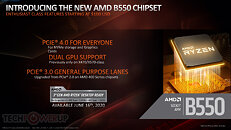
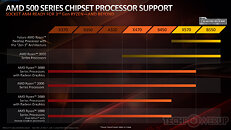
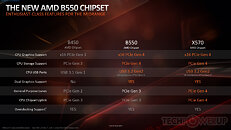
AMD B550 motherboards will feature partial PCI-Express gen 4.0 support. The main PCI-Express x16 slot, and one of the M.2 NVMe slots that are wired to the "Matisse" processor will be PCI-Express gen 4.0, however, all downstream PCIe lanes put out by the B550 chipset are gen 3.0. This is still a step up from 400-series "Promontory" chipsets, which are limited to gen 2.0. B550 puts out eight PCIe gen 3.0 lanes, which combine with the 20 usable processor lanes from "Matisse" to take the platform's total PCIe budget to 28 lanes (x16 gen 4.0 + x4 gen 4.0 + x8 gen 3.0). The B550 chipset itself connects to the "Matisse" processor via a PCI-Express 3.0 x4 connection.
In terms of connectivity, AMD's B550 chipset puts out up to six SATA 6 Gbps ports with AHCI and RAID capability; two each of 10 Gbps USB 3.2 gen 2 and 5 Gbps USB 3.2 gen 1 ports; and six USB 2.0 ports. PCIe, SATA, and USB connectivity from the "Matisse" processor is unchanged: four 10 Gbps USB 3.2 gen 2 ports, and up to two SATA 6 Gbps ports.
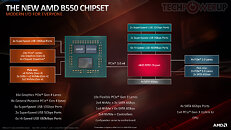
The processor includes a PCI-Express 4.0 x16 PEG connection that can be split between slots. AMD is allowing motherboard designers to have multi-GPU capability with the B550, where the x16 PEG link is split between two x16 slots (electrical x8). Previously this capability was limited to the top-tier X370 and X470 boards. The processor also puts out one PCI-Express 4.0 x4 link meant to drive one M.2 NVMe slot or U.2 NVMe port. Every B550 motherboard we've seen so far features one M.2 PCIe gen 4.0 x4 (64 Gbps) slot.
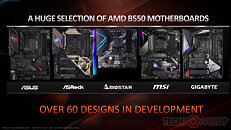
As with both its predecessors, the B350 and B450, the new B550 chipset enables full multiplier-based CPU overclocking, along with broad memory overclocking support. Motherboard designers are at liberty to kit out the B550 with the most elaborate CPU VRM solutions. Expect some of the pricier B550 boards to match their X570 counterparts in overclocking capability.
Motherboards based on the AMD B550 chipset are expected to launch on June 16, 2020. Prices start at $100, according to AMD.
View at TechPowerUp Main Site
The AMD B550 currently only supports 3rd generation Ryzen "Matisse" processors. Ryzen 3000 "Picasso" APU are not supported. What's more, older Ryzen 2000 "Pinnacle Ridge," "Raven Ridge," and first gen Ryzen 1000 "Summit Ridge" aren't supported, either. The Athlon 200 and 3000 "Zen" based chips miss out, too. AMD argues that it ran into ROM size limitations when trying to cram AGESA microcode for all the older processors. We find that hard to believe because B450 motherboards with the latest ComboAM4 AGESA support 2nd gen and 3rd gen processors, including APUs and Athlon SKUs based on the two. On the bright side, AMD assured us (within its marketing slides for the B550), that the chipset will support upcoming processors based on the "Zen 3" microarchitecture. The company also came up with a new motherboard packaging label that clarifies that the processors won't work with the 3400G and 3200G.



AMD B550 motherboards will feature partial PCI-Express gen 4.0 support. The main PCI-Express x16 slot, and one of the M.2 NVMe slots that are wired to the "Matisse" processor will be PCI-Express gen 4.0, however, all downstream PCIe lanes put out by the B550 chipset are gen 3.0. This is still a step up from 400-series "Promontory" chipsets, which are limited to gen 2.0. B550 puts out eight PCIe gen 3.0 lanes, which combine with the 20 usable processor lanes from "Matisse" to take the platform's total PCIe budget to 28 lanes (x16 gen 4.0 + x4 gen 4.0 + x8 gen 3.0). The B550 chipset itself connects to the "Matisse" processor via a PCI-Express 3.0 x4 connection.
In terms of connectivity, AMD's B550 chipset puts out up to six SATA 6 Gbps ports with AHCI and RAID capability; two each of 10 Gbps USB 3.2 gen 2 and 5 Gbps USB 3.2 gen 1 ports; and six USB 2.0 ports. PCIe, SATA, and USB connectivity from the "Matisse" processor is unchanged: four 10 Gbps USB 3.2 gen 2 ports, and up to two SATA 6 Gbps ports.

The processor includes a PCI-Express 4.0 x16 PEG connection that can be split between slots. AMD is allowing motherboard designers to have multi-GPU capability with the B550, where the x16 PEG link is split between two x16 slots (electrical x8). Previously this capability was limited to the top-tier X370 and X470 boards. The processor also puts out one PCI-Express 4.0 x4 link meant to drive one M.2 NVMe slot or U.2 NVMe port. Every B550 motherboard we've seen so far features one M.2 PCIe gen 4.0 x4 (64 Gbps) slot.

As with both its predecessors, the B350 and B450, the new B550 chipset enables full multiplier-based CPU overclocking, along with broad memory overclocking support. Motherboard designers are at liberty to kit out the B550 with the most elaborate CPU VRM solutions. Expect some of the pricier B550 boards to match their X570 counterparts in overclocking capability.
Motherboards based on the AMD B550 chipset are expected to launch on June 16, 2020. Prices start at $100, according to AMD.
View at TechPowerUp Main Site







